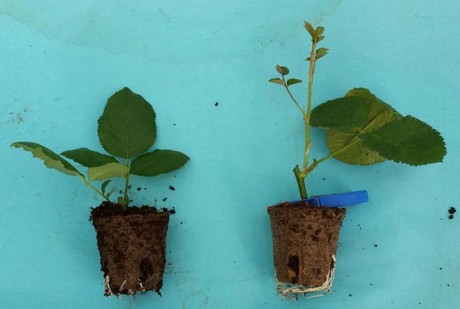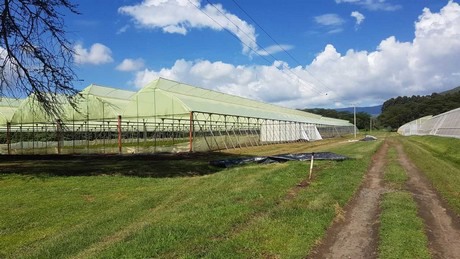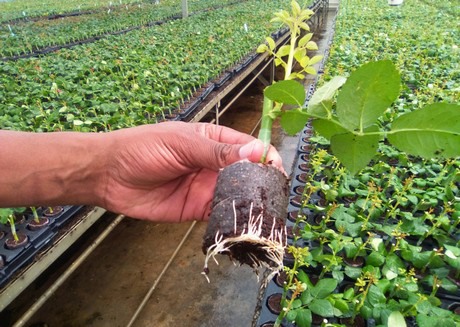The majority of rose plants used for professional cut flower production worldwide are grown on the Natal Briar rootstock. It was introduced by Dr. Peter van de Pol Sr. around 1985. Combined with his invention of top grafting quickly made it the standard in cut rose production. Today around 90 percent of cut roses worldwide are grown on this rootstock. However, a new rootstock has entered the market recently, and it seems to be supplanting Natal Briar. These so-called 'PRO rootstocks' - bred by van de Pol Sr. - were officially launched in 2016 by Plant Research Overberg (PRO) in Europe and Africa as ProRoot and the year after in Latin America. In Kenya, for example, they had to triple the production in just two years time to meet the demand.
 Peter van de Pol jr. at the IFTEX in Nairobi last year.
Peter van de Pol jr. at the IFTEX in Nairobi last year.
10-20% increase in biomass
There are two types of PRO rootstocks available - Protatu and Protano - and both varieties increase the biomass of the plant. "Depending on the rootstock-variety combination, the plant will either have more, thicker or longer stems. In general 10-20% more yield expressed in kg/m2 is possible and we have even seen higher yields", explains son and namesake Peter van de Pol jr. "Varieties which cause problems like thin stems, lack of numbers etc, may become interesting again", he adds.
Continuous trials reveal that even better results can be achieved. For example, by adjusting the nutrients. "As most of the crops are grown on Natal Briar, the fertiliser recipes are adjusted accordingly. PRO rootstocks, may react differently on nutrients. Natal Briar, for example, poisoned itself in the '80s with borium. The PRO rootstocks, in contrast, can use a bit more borium, this is just one example. The nutrient differences can be visible in color of the flower, as well as the crop itself. We are continuously working on and finding solutions to get even better results out of the PRO rootstocks. Simply said: if the engine runs faster you may have to adjust your fuel. However: for roughly 70% of the varieties it just works without major changes".

Cutting vs. topgraft on PRO Rootstock, same age
Expanding rapidly in Kenya
The rootstocks are produced in Europe, Africa, Latin America and India, and from the very beginning, the main focus of Plant Research Overberg has been on Africa and Europe where PRO operates under the name "ProRoot". After 10 years of testing, the rootstocks were official launched in 2016. Since this launch, they have seen the demand increasing rapidly, which resulted in several expansions of their PRO rootstock production.
After growing PRO rootstocks inside the greenhouses of Stokman Rozen in Naivasha, Kenya it was decided to establish a greenhouse that would be fully used for the production of PRO rootstocks. "The demand exceeded the supply, so we needed more space quickly. Besides: for sanitary reasons we wanted own ProRoot greenhouses to be able to have full control", van de Pol says. So, in 2016, they started building a 0.5 ha greenhouse and started production in January 2017. In the fall of that year, they noticed the need for another expansion. "2017 was quite a challenging year because of the drought in East-Africa. Because of the lack of water not that many new plants were planted. Therefore, we started to conduct trials at many different farms, and the results led to a boost in demand for PRO rootstocks. Compared to last year, the demand tripled. I think we may grow to a market share of 20 percent this year." So, in order to meet the high demand, a new 1.2 ha greenhouse was established and it was ready for planting last March. Currently, the mother plants are being grown in the greenhouse.
New ProRoot greenhouse at Stokman Rozen, building in progress. The greenhouse is finished now.
Europe and Latin America
In Europe and Latin America, they are also gaining a larger foothold. In Europe - where the rootstocks are produced by Interrose (Kordes) in De Kwakel, the Netherlands - several Dutch growers are also growing roses on PRO rootstocks with very good results and can maybe, because of the increase in yield, lower their energy costs and save on lighting with the same production. "As a result, rose growing can become more sustainable as well."
In Latin America, they recently launched the PRO Rootstocks. They are produced by Plantec in Ecuador and the results seem to be in line with those in Kenya. In turn, the demand is already high. "The PRO rootstocks were launched officially in Kenya in 2016, but we have been trialing for many years in advance. And this experience in Kenya works in our favor. When we started in Kenya, one of the most asked questions was, will the rootstocks hold 5-6 years? At that time, we could not answer such a question, but now we know it holds and we can show it to our Latin American growers."
ProRoot Rootstock in action.
Rootstocks for garden roses
Next to enhancing the results of rootstocks for cut flower production, Plant Research Overberg is spreading its wings and diving into the development of rootstocks for garden roses. According to van de Pol, their rootstocks combined with knowledge of how roses grow on their rootstocks in the greenhouse can help shorten the production of garden roses. "With our rootstocks, we can decrease the production period from from three years to 12-18 weeks and grow better stronger plants. It is something we are still trialing, but so far, the results and reactions look promising."
From June 6 to June 8, Plant Research Overberg / ProRoot Ltd. will be present at the IFTEX fair in Nairobi, at stand number C1.05.














